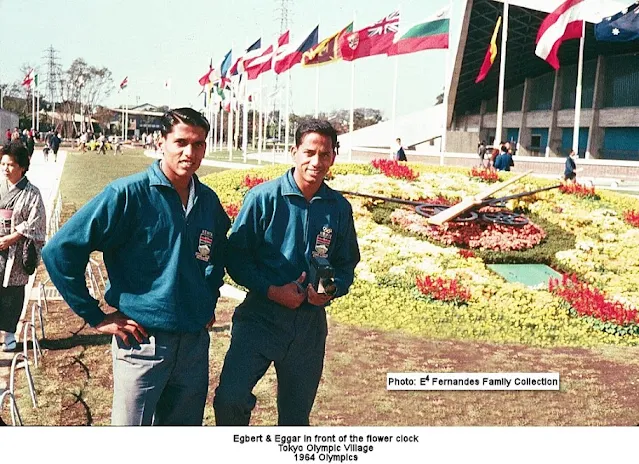TOKYO
1964: the day Goan and Kenyans hearts broke
By Cyprian Fernandes
ANYONE
who knew Seraphino Antao, Kenya’s Commonwealth Games double sprint gold
medalist, can ever forget the heartbreak of the 1964 Olympic Games. He carried
the hopes of the whole country and his fans around the world, only to leave the
sport he loved so much with a broken heart.
Not
so long ago, I recalled the pain and disappointment of Tokyo: In June,
Seraphino Antao’s (originally from Chandor) preparation for Tokyo 1964 Olympics
was going well and as he headed for Europe, he was confident of great things.
During the Kenya trials at Lower Kabete, just outside of Nairobi, he had
clocked a wind-assisted 9.5 seconds for the 100 yards and 21.1 for the 220
yards. He maintained the mark for the 100 yards in the Kenya championships in
Kisumu but improved his time for the 220 setting a respectable 20.8 seconds.
In
Europe, he had been in scintillating form winning at the White City in London,
Czechoslovakia, Poland, Sweden, and many other countries.
Before
he left with the Kenya team for Tokyo, he had told me he was feeling really
good about the challenges ahead. He felt, at 27 years of age, he was nearing
the peak of his form. He was very confident.
On
the day before the flag raising ceremony (two days before the heats of the 100
metres), we got the news that he had been struck down with mild influenza and
the country held its breath which later turned to complete heartbreak because
he never recovered enough to run at his best, or even to make an attempt at
running. While he was nothing but confident arriving in Tokyo, he had a
worrying secret: he was also carrying a hamstring injury which he had suffered
in training. He was confident it would heal by the time the heats for the
sprints started. It was not to be.
He
knew the day before the opening ceremony that all was not well with him. He
feared he would not be able to run at all. Disappointed, he handed the Kenya
flag which he was due to carry at the lead of the Kenya team into the stadium
to his friend, the great Kipchoge Keino. He failed to qualify in either 100
metres or the 200 metres.
He
made his mind up to quit athletics altogether. He was shattered to say the
least. Many months later when I spoke to him, there were tears in his eyes when
speaking of the disappointment of Tokyo. “I just could not get myself to go
through it all again … sometimes training at daybreak and late into the night,
no matter what the weather, holding down a full-time job, and then to be
knocked out by influenza when I was at the peak of my performance … I was
shattered. I just could not go on,” he told me.
I
tried to talk him out of it, saying that at 27, he was pretty young. However,
he was very angry that fate and illness had denied him his moment in destiny.
He was convinced that he had nothing left to give. In Tokyo, it was a now or
never moment for him. He knew he did nothing wrong. He blamed his bad luck in
falling ill. He felt abandoned by the gods. He was so very angry about it
especially since he wanted to win an Olympic medal for the people of Kenya and
his own family.
Goans
have been representing Kenya since the Melbourne Olympics in 1956. Two tribes
dominated selection for the Olympics and international matches: the Goans and
the Sikhs. In almost three decades of Olympic hockey, Kenya’s best performance
was 6th and 4th in the World Cup.
The
Olympic wreath of greatest could easily have been crowned any of the following
players: Alu Mendonca (1956, 1960, 1964, 1968), Reynold D’Souza (1956, 1964),
Hilary Fernandes ( 1960, 64, 68), Leo Fernandes, (1964, 68, 72), Egbert Fernandes
(1960, 1964, 1968), Edgar Fernandes (1960, 64), Saude George (1960, 64),
Anthony Vaz (1956, 60, 64), Silu Fernandes (1960, 64, 68). Other Goans to
represent Kenya: Rosario Delgado, Michael Pereira (1956), Reynolds Pereira
(1968, 1972, 1976), Philip D’Souza (1972), Raphael Fernandes (1984). George
Moraes, Poly Pereira and Willie Lobo represented Uganda in 1972 and Frederick
Furtado, Soter D’Silva and Stephen D’Silva represented Tanzania in 1980.








Comments